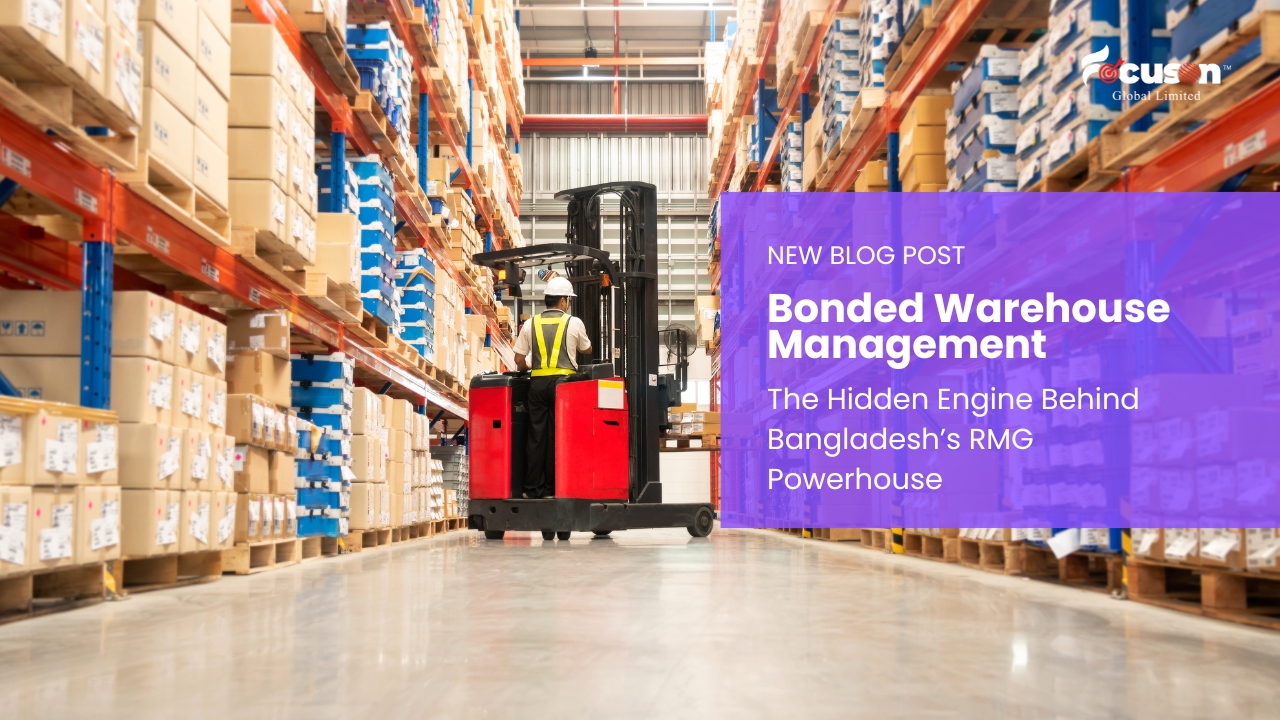News & Article
Bonded Warehouse Management in Bangladesh: The Hidden Engine of the RMG Supply Chain

In the bustling heart of Bangladesh’s ready-made garments (RMG) industry lies a lesser-discussed but absolutely critical backbone: the bonded warehouse. While headlines often focus on design, labour, or fashion trends, the smooth movement of raw materials into factories and finished goods out of the country depends heavily on what happens inside bonded warehouse operations.
What Is a Bonded Warehouse?
A bonded warehouse is a licensed storage or manufacturing space where imported goods can be stored and processed duty-free, as long as they are meant for export. This system, regulated by the National Board of Revenue (NBR) and Customs Bond Commissionerate, enables RMG companies to keep working capital free and operations compliant (NBR Bangladesh).
Companies within Export Processing Zones (EPZs) and Domestic Tariff Areas (DTAs) both rely on bonded systems—though with different rules and compliance structures. To understand this distinction, read our detailed breakdown in EPZ vs. DTA — Understanding the Two Faces of Bonded Warehouse Operations.
Why It Matters for Bangladesh’s RMG Sector
Bangladesh’s RMG sector exports account for over 80 % of the country’s total export earnings. For these exports to remain competitive globally, factories need uninterrupted access to fabrics, accessories and components—often imported. The bonded warehouse regime allows companies to import these materials with duty held in abeyance, manufacture the garments, and then ship the final goods, thereby reducing cash-flow burdens and import duty costs. cbc.gov.bd+1
How the Workflow Typically Looks
- A factory or supplier obtains a bond licence from the Customs Bond Commissionerate. cbcctg.gov.bd+1
- Raw materials (e.g., fabrics, trims) are imported and admitted into the bonded warehouse without paying duties upfront.
- The materials are used for manufacturing finished garments destined for export.
- After export, or in case of movement for domestic consumption (in certain cases), duties may be applied.
- The bonded operations unit must maintain accurate documentation and utilization declarations, passing audits when needed. The Financial Express
EPZ vs DTA Context
For many RMG companies operating in an Export Processing Zone (EPZ) under the Bangladesh Export Processing Zones Authority (BEPZA), the bonded warehouse regime is integrated with special export-oriented incentives. For example, material imported under bond for use in an EPZ unit is often treated as 100 % export-oriented and enjoys smoother procedures. bepza.gov.bd+1
Major Challenges & Compliance Risks
Despite its benefits, the regime has its share of challenges:
- The legal basis for bonded operations in Bangladesh has been broadly based (e.g., via the Customs Act, 1969) and not always fully harmonised. cbc.gov.bd+1
- In many cases, transaction-by-transaction control is still used rather than a risk-based regime, which slows down operations. cbc.gov.bd
- Non-compliance (e.g., incorrect utilisation declarations, missing audits) can lead to licence suspension, duty demands or stoppage of shipments. The Financial Express
The Career & Professional Angle
For professionals in the RMG sector — whether fresh graduates, junior executives or non-managerial staff (0-8 years experience) — understanding bonded warehouse management is a differentiator. It means:
- Having the documentation know-how to support commercial or logistics operations.
- Being able to liaise with customs, C&F agents and banks.
- Ensuring smooth export flow and avoiding compliance bottlenecks.
At FocusOn™ Global Limited, we believe that mastering bonded warehouse management is not just a niche skill—it’s a career-accelerator. That’s why we’ll soon be offering a dedicated two-day onsite training programme to make you job-ready in this essential area. (Link internally to training landing page: /training-bonded-warehouse-management)
Why Now Is the Right Time
With regulatory enhancements (such as the recent extended bond-license facility for EPZ companies) companies are under pressure to raise their compliance game. The Financial Express And this means RMG employers are looking for staff who already know how to manage bonded operations, documentation workflows, and liaison with regulatory agencies.
Final Thoughts
In summary: the export success of Bangladesh’s RMG sector depends not just on factories and labor, but on the invisible infrastructure of bonded warehousing. For anyone seeking to build a career, step into export documentation, or elevate their logistics/commercial competence, this is a high-value domain. Stay tuned for the upcoming FocusOn™ training on bonded warehouse management—and prepare to unlock a high-impact career asset.
